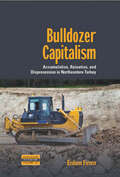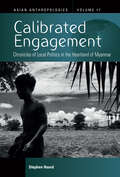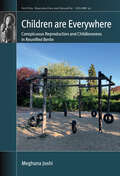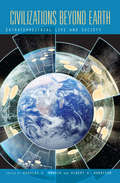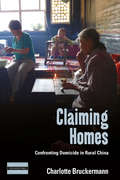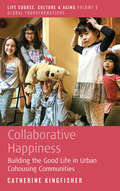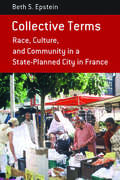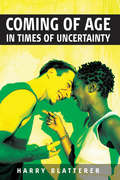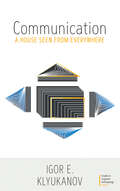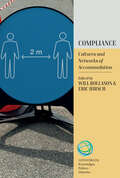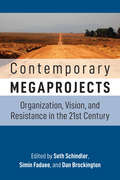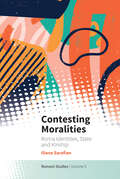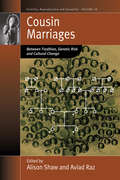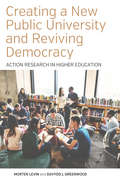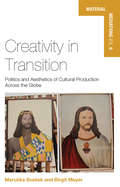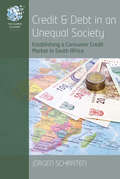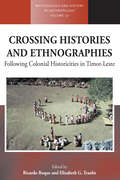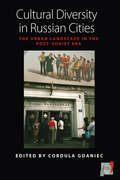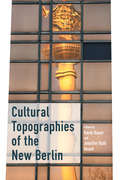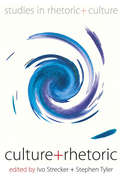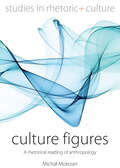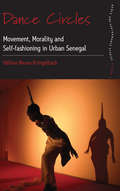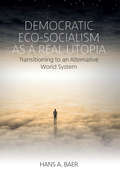- Table View
- List View
Bulldozer Capitalism: Accumulation, Ruination, and Dispossession in Northeastern Turkey (Dislocations #31)
by Erdem EvrenSet in the resource frontier of northeastern Turkey, Bulldozer Capitalism studies the rise and decline of an anti-dam/anti-displacement campaign and the political responses to other extractive projects that it helped to shape in its aftermath. The book shows that people can accommodate their own dispossession and displacement if they are directed to negotiate, invest in, and speculate on the destruction of their built environment and nature, and their material and immaterial bonds, wealth, and activities.
Calibrated Engagement: Chronicles of Local Politics in the Heartland of Myanmar (Asian Anthropologies #17)
by Stéphen HuardFor decades, the heartland of Myanmar has been configured as a pacified space under military surveillance. A closer look reveals how politics is enacted at distance with the state. Calibrated Engagement weaves together ethnography and history to chronicle the transformation of rural politics in Anya, the dry lands of central Myanmar. The book presents situations as varied as local elections, inheritance transmissions, land conflicts and ceremonies, to show that politics is about how people calibrate the way they engage with each other.
Children are Everywhere: Conspicuous Reproduction and Childlessness in Reunified Berlin (Fertility, Reproduction and Sexuality: Social and Cultural Perspectives #53)
by Meghana JoshiChildren are Everywhere engages with how demographic anxieties and reproductive regimes emerge as forms of social inclusion and exclusion in a low fertility Western European context. This book explores everyday experiences of parenting and childlessness of ‘ethnic’ Germans in Berlin, who came of age around the fall of the Berlin Wall, and brings them into conversation with theories on parenting, waithood, non-biological intimacies, and masculinities. This is the first ethnographic work by a South Asian author on demographic anxieties and reproduction in Germany and reverses the anthropological gaze to study Europe as the ‘Other.’
Civilizations Beyond Earth
by Douglas A. Vakoch Albert A.Astronomers around the world are pointing their telescopes toward the heavens, searching for signs of intelligent life. If they make contact with an advanced alien civilization, how will humankind respond? In thinking about first contact, the contributors to this volume present new empirical and theoretical research on the societal dimensions of the Search for Extraterrestrial Intelligence (SETI). Archaeologists and astronomers explore the likelihood that extraterrestrial intelligence exists, using scientific insights to estimate such elusive factors as the longevity of technological societies. Sociologists present the latest findings of novel surveys, tapping into the public's attitudes about life beyond Earth to show how religion and education influence beliefs about extraterrestrials. Scholars from such diverse disciplines as mathematics, chemistry, journalism, and religious studies offer innovative solutions for bridging the cultural gap between human and extraterrestrial civilizations, while recognizing the tremendous challenges of communicating at interstellar distances. At a time when new planets are being discovered around other stars at an unprecedented rate, this collection provides a much needed guide to the human impact of discovering we are not alone in the universe.
Claiming Homes: Confronting Domicide in Rural China (Dislocations #26)
by Charlotte BruckermannChinese citizens make themselves at home despite economic transformation, political rupture, and domestic dislocation in the contemporary countryside. By mobilizing labor and kinship to make claims over homes, people, and things, rural residents withstand devaluation and confront dispossession. As a particular configuration of red capitalism and socialist sovereignty takes root, this process challenges the relationship between the politics of place and the location of class in China and beyond.
Collaborative Happiness: Building the Good Life in Urban Cohousing Communities (Life Course, Culture and Aging: Global Transformations #8)
by Catherine KingfisherUnderstudied relative to other forms of intentional community, and under-recognized in policy-making circles, urban cohousing communities situate wellbeing as simultaneously social and subjective, while catering for groups of people so diverse in age. Collaborative Happiness looks at two such urban cohousing communities: Kankanmori, in Tokyo; and Quayside Village, in Vancouver. In expanding beyond mainstream approaches to happiness focused exclusively on the individual, Quayside Village and Kankanmori provide an alternative model for how to understand and practice the good life in an increasingly urbanized world marked by crisis of both social and environmental sustainability.
Collaborative Happiness: Building the Good Life in Urban Cohousing Communities (Life Course, Culture and Aging: Global Transformations #8)
by Catherine KingfisherUnderstudied relative to other forms of intentional community, and under-recognized in policy-making circles, urban cohousing communities situate wellbeing as simultaneously social and subjective, while catering for groups of people so diverse in age. Collaborative Happiness looks at two such urban cohousing communities: Kankanmori, in Tokyo; and Quayside Village, in Vancouver. In expanding beyond mainstream approaches to happiness focused exclusively on the individual, Quayside Village and Kankanmori provide an alternative model for how to understand and practice the good life in an increasingly urbanized world marked by crisis of both social and environmental sustainability.
Collective Terms
by Beth S. EpsteinThe banlieue, the mostly poor and working-class suburbs located on the outskirts of major cities in France, gained international media attention in late 2005 when riots broke out in some 250 such towns across the country. Pitting first- and second-generation immigrant teenagers against the police, the riots were an expression of the multiplicity of troubles that have plagued these districts for decades. This study provides an ethnographic account of life in a Parisian banlieue and examines how the residents of this multiethnic city come together to build, define, and put into practice their collective life. The book focuses on the French ideal of integration and its consequences within the multicultural context of contemporary France. Based on research conducted in a state-planned ville nouvelle, or New Town, the book also provides a view on how the French state has used urban planning to shore up national priorities for social integration. Collective Terms proposes an alternative reading of French multiculturalism, suggesting fresh ways for thinking through the complex mix of race, class, nation, and culture that increasingly defines the modern urban experience.
Coming Of Age In Times Of Uncertainty
by Harry BlattererAdulthood is taken for granted. It connotes the end of childhood, the resolution to the "storm and stress" period of adolescence. This conception is strongly entrenched in the sociology of youth and the sociology of the life course as well as in the policy arena. At the same time, adulthood itself remains unarticulated; journey's end remains conceptually fixed and theoretically uncontested. Adulthood, then, is both central to the social imagination and neglected as an area of sociological investigation, something that has been noted by sociologists over the last four decades. Going beyond the overwhelmingly psychological literature, this book draws on original qualitative research and theories of social recognition and thus presents a first step towards filling an important gap in our understanding of the meaning of adulthood.
Communication: A House Seen from Everywhere (Studies in Linguistic Anthropology #2)
by Igor E. KlyukanovFocusing on the scientific study of communication, this book is a systematic examination. To that end, the natural, social, cultural, and rational scientific perspectives on communication are presented and then brought together in one unifying framework of the semiotic square, showing how all four views are interconnected. The question of whether the study of communication can be considered a unique science is addressed. It is argued that communication is never separate from any object of study and thus we always deal with its manifestations, captured in the four scientific perspectives discussed in the book.
Compliance: Cultures and Networks of Accommodation (Lifeworlds: Knowledges, Politics, Histories #3)
by Eric Hirsch Will RollasonExploring compliance from an anthropological perspective, this book offers a varied and international selection of chapters covering taxation, corporate governance, medicine, development, carbon offsetting, irregular migration and the building trade. Compliance emerges as more than the opposite of resistance: instead, it appears as a valuable heuristic approach for understanding collective life, as a means by which actors strive to accommodate themselves to others. This perspective transcends conventional distinctions between power and resistance, and offers to open up new avenues of anthropological enquiry.
Contemporary Megaprojects: Organization, Vision, and Resistance in the 21st Century
by Seth Schindler, Simin Fadaee and Dan BrockingtonContemporary megaprojects have evolved from the discreet, modernist projects undertaken in the past by centralized authorities to encompass everything from large-scale construction to space exploration. Contemporary Megaprojects explores how these projects have been impacted by cutting-edge technology, the private sector, and the processes of decentralization and dematerialization. With case studies ranging from mega-plantations in Southeast Asia to ocean mapping to sports events, the contributions in this collected volume demonstrate the increasing ambition and pervasiveness of these projects, as well as their significant impact on both society and the environment.
Contesting Moralities: Roma Identities, State and Kinship (New Directions in Romani Studies #5)
by Iliana SarafianRoma identities have often been presented in literature as collectively constructed and in opposition to those who are not Roma. Contesting Moralities challenges these preconceptions about Roma identification by disentangling the binaries between Roma and non-Roma, state and non-state, public and private. It explores topics resonating in contemporary Romani studies that are in need of further exploration through individual perspectives, including history, activism, kinship, childhood, and gender hierarchies. The book paints a complex picture of inequality and how it is negotiated amid conflicting, ambiguous and contradictory regimes of power and moral demands, including those of state and kin.
Cousin Marriages: Between Tradition, Genetic Risk and Cultural Change (Fertility, Reproduction and Sexuality: Social and Cultural Perspectives #28)
by Alison Shaw Aviad RazJuxtaposing contributions from geneticists and anthropologists, this volume provides a contemporary overview of cousin marriage and what is happening at the interface of public policy, the management of genetic risk and changing cultural practices in the Middle East and in multi-ethnic Europe. It offers a cross-cultural exploration of practices of cousin marriage in the light of new genetic understanding of consanguineous marriage and its possible health risks. Overall, the volume presents a reflective, interdisciplinary analysis of the social and ethical issues raised by both the discourse of risk in cousin marriage, as well as existing and potential interventions to promote “healthy consanguinity” via new genetic technologies.
Creating a New Public University and Reviving Democracy: Action Research in Higher Education (Higher Education in Critical Perspective: Practices and Policies #2)
by Morten Levin Davydd J. GreenwoodPublic universities are in crisis, waning in their role as central institutions within democratic societies. Denunciations are abundant, but analyses of the causes and proposals to re-create public universities are not. Based on extensive experience with Action Research-based organizational change in universities and private sector organizations, Levin and Greenwood analyze the wreckage created by neoliberal academic administrators and policymakers. The authors argue that public universities must be democratically organized to perform their educational and societal functions. The book closes by laying out Action Research processes that can transform public universities back into institutions that promote academic freedom, integrity, and democracy.
Creativity in Transition: Politics and Aesthetics of Cultural Production Across the Globe
by Maruška Svašek Birgit MeyerIn an era of intensifying globalization and transnational connectivity, the dynamics of cultural production and the very notion of creativity is in transition. Exploring creative practices in various settings, the book does not only call attention to the spread of modernist discourses of creativity, from the colonial era to the current obsession with 'innovation' in neo-liberal capitalist cultural politics, but also to the less visible practices of copying, recycling and reproduction that occur as part and parcel of creative improvisation.
Credit and Debt in an Unequal Society: Establishing a Consumer Credit Market in South Africa (The Human Economy #7)
by Jürgen SchratenSouth Africa was one of the first countries in the Global South that established a financialized consumer credit market. This market consolidates rather than alleviates the extreme social inequality within a country. This book investigates the political reasons for adopting an allegedly self-regulating market despite its disastrous effects and identifies the colonialist ideas of property rights as a mainstay of the existing social order. The book addresses sociologists, political scientists, anthropologists and legal scholars interested in the interaction of economy and law in contemporary market societies.
Crossing Histories and Ethnographies: Following Colonial Historicities in Timor-Leste (Methodology & History in Anthropology #37)
by Ricardo Roque Elizabeth G. TraubeThe key question for many anthropologists and historians today is not whether to cross the boundary between their disciplines, but whether the idea of a disciplinary boundary should be sustained. Reinterpreting the dynamic interplay between archive and field, these essays propose a method for mutually productive crossings between historical and ethnographic research. It engages critically with the colonial pasts of indigenous societies and examines how fieldwork and archival studies together lead to fruitful insights into the making of different colonial historicities. Timor-Leste’s unusually long and in some ways unique colonial history is explored as a compelling case for these crossings.
Crossing Histories and Ethnographies: Following Colonial Historicities in Timor-Leste (Methodology & History in Anthropology #37)
by Ricardo Roque and Elizabeth G. TraubeThe key question for many anthropologists and historians today is not whether to cross the boundary between their disciplines, but whether the idea of a disciplinary boundary should be sustained. Reinterpreting the dynamic interplay between archive and field, these essays propose a method for mutually productive crossings between historical and ethnographic research. It engages critically with the colonial pasts of indigenous societies and examines how fieldwork and archival studies together lead to fruitful insights into the making of different colonial historicities. Timor-Leste’s unusually long and in some ways unique colonial history is explored as a compelling case for these crossings.
Cultural Diversity In Russian Cities
by Cordula GdaniecCultural diversity -- the multitude of different lifestyles that are not necessarily based on ethnic culture -- is a catchphrase increasingly used in place of multiculturalism and in conjunction with globalization. Even though it is often used as a slogan it does capture a widespread phenomenon that cities must contend with in dealing with their increasingly diverse populations. The contributors examine how Russian cities are responding and through case studies from Moscow, St. Petersburg, Novosibirsk, and Sochi explore the ways in which different cultures are inscribed into urban spaces, when and where they are present in public space, and where and how they carve out their private spaces. Through its unique exploration of the Russian example, this volume addresses the implications of the fragmented urban landscape on cultural practices and discourses, ethnicity, lifestyles and subcultures, and economic practices, and in doing so provides important insights applicable to a global context.
Cultural Topographies of the New Berlin
by Karin Bauer Jennifer Ruth HosekSince Unification and the end of the Cold War, Berlin has witnessed a series of uncommonly intense social, political, and cultural transformations. While positioning itself as a creative center populated by young and cosmopolitan global citizens, the “New Berlin” is at the same time a rich site of historical memory, defined inescapably by its past even as it articulates German and European hopes for the future. Cultural Topographies of the New Berlin presents a fascinating cross-section of life in Germany’s largest city, revealing the complex ways in which globalization, ethnicity, economics, memory, and national identity inflect how its urban spaces are inhabited and depicted.
Culture And Rhetoric
by Ivo Strecker Stephen TylerWhile some scholars have said that there is no such thing as culture and have urged to abandon the concept altogether, the contributors to this volume overcome this impasse by understanding cultures and their representations for what they ultimately are - rhetorical constructs. These senior, international scholars explore the complex relationships between culture and rhetoric arguing that just as rhetoric is founded in culture, culture is founded in rhetoric. This intersection constitutes the central theme of the first part of the book, while the second is dedicated to the study of figuration as a common ground of rhetoric and anthropology. The book offers a compelling range of theoretical reflections, historical vistas, and empirical investigations, which aim to show how people talk themselves and others into particular modalities of thought and action, and how rhetoric and culture, in this way, are co-emergent. It thus turns a new page in the history of academic discourse by bringing two disciplines - anthropology and rhetoric - together in a way that has never been done before.
Culture Figures: A Rhetorical Reading of Anthropology (Studies in Rhetoric and Culture #10)
by Michał MokrzanEthnographic research, anthropological theory, and the understanding of the objects of inquiry, are co-created through figuration (using tropes and rhetorical figures) and techniques of persuasion. Delving into descriptive ethnography and theoretical texts spanning across classical monographs and recent texts in cultural anthropology, Culture Figures places rhetoric and rhetoricity as central to the discipline’s self-understanding. It focuses on how understandings of ‘culture’ and social life are shaped and conveyed in cultural anthropology through textual rhetoric. The book demonstrates how processes of using tropes and modes of persuasion underlie the creation of meanings or misunderstandings in society.
Dance Circles
by Helene Neveu KringelbachSenegal has played a central role in contemporary dance due to its rich performing traditions, as well as strong state patronage of the arts, first under French colonialism and later in the postcolonial era. In the 1980s, when the Senegalese economy was in decline and state fundingwithdrawn, European agencies used the performing arts as a tool in diplomacy. This had a profound impact on choreographic production and arts markets throughout Africa. In Senegal, choreographic performers have taken to contemporary dance, while continuing to engage with neo-traditional performance, regional genres like the sabar, and the popular dances they grew up with. A historically informed ethnography of creativity, agency, and the fashioning of selves through the different life stages in urban Senegal, this book explores the significance of this multiple engagement with dance in a context of economic uncertainty and rising concerns over morality in the public space.
Democratic Eco-Socialism as a Real Utopia: Transitioning to an Alternative World System
by Hans A. BaerAs global economic and population growth continues to skyrocket, increasingly strained resources have made one thing clear: the desperate need for an alternative to capitalism. In Democratic Eco-Socialism as a Real Utopia, Hans Baer outlines the urgent need to reevaluate historical definitions of socialism, commit to social equality and justice, and prioritize environmental sustainability. Democatic eco-socialism, as he terms it, is a system capable of mobilizing people around the world, albeit in different ways, to prevent on-going human socio-economic and environmental degradation, and anthropogenic climate change.
